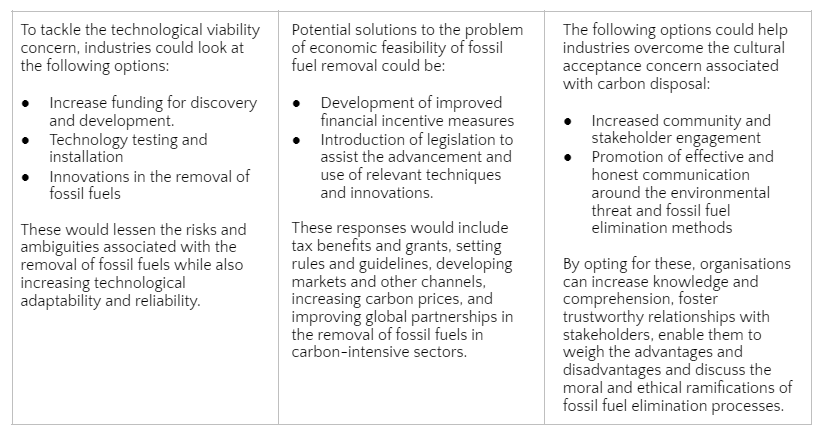The complete elimination of fossil fuels from the global economy is one of the most challenging concerns for the world. Most of the world’s human-generated greenhouse gases and more than one-third of total methane releases are caused by the extraction, preparation and burning of fossil fuels. The manufacturing of metals such as aluminum, steel and cement and sectors such as chemicals, transportation and textiles are among the largest producers of emissions. These sectors continue to rely on conventional fuels such as coal, natural gas and oil. Until these emissions are eliminated from the environment, it will be difficult to keep the earth’s temperature from rising by 1.5°C or lower than 2°C (as agreed in the international target set in the Paris Agreement) compared with levels before the global industrialization.
- To focus on this issue, various fossil fuel disposal techniques have been introduced, involving the elimination of greenhouse gases generated and the pollutants caused by burning fossil fuels. These were expected to play a crucial role in attaining global zero-emission levels by the mid-century and in combating global warming. However, they have been facing numerous obstacles related to ecological consequences, cultural acceptance, financial sustainability, and technology affordability.
- One of the primary obstacles to the elimination of fossil fuels is the economic/financial viability of the techniques and technologies used. The cost of eliminating fossil fuels varies significantly based on the approach, environment, and scope of a project. A recent study found that the mean cost of removing fossil fuels varies between $8 and $393/tCO2 eliminated. However, the cost does not account for the societal and environmental advantages such as reduced environmental damage, increased biodiversity value, and the negative impact on food and land availability and access. Additionally, existing regulatory structures for economic incentives are insufficient to foster the development and deployment of these technologies.
- The technological viability of these methods is another major obstacle. A number of techniques including accelerated precipitation, trapping emission in the soil, bioenergy with carbon capture and storage (BECCS), direct air capture and storage (DACS) and marine fertilisation can be used to eliminate fossil fuel use or greenhouse gases caused by the burning of fossil fuels. Scarcity of water, ground and organic resources; power and finance needs; stability and carbon leakage concerns; and adaptability and implementation possibilities are just a few of the constraints that come with each of these technologies.
- Acceptance by the public: The elimination of fossil fuels has not gained full social acceptance due to many factors that influence the views of the general population. These factors include the following:
- Insufficient understanding and comprehension of environmental issues and possible remedies
- Lack of trust in organizations and participants
- Perceptions of the risks and advantages of the technologies and techniques used.
- Ethical and moral ramifications of initiatives
- Involvement and inputs of stakeholders impacted by the fossil fuel elimination processes.
These challenges have made the current pace of fossil fuel reduction far more sluggish than the pace required to meet the international target set in the Paris Agreement to keep the temperature well below 2°C. The Intergovernmental Panel on Climate Change (IPCC) recently stated that there was only one by two percent possibility of limiting the temperature rise to lower than 1.5°C.
Sectors for which fossil fuel is one of the primary inputs and which find it challenging to switch to alternative options can follow the approaches below to address challenges in their decarbonization journey.

The elimination of fossil fuel use is a crucial measure that all sectors will have to focus on in the coming future. It is important for industries to identify and understand existing challenges in their operations that are posing barriers in the carbon reduction pathway. The sectors can also utilize the knowledge shared by climate-focused institutions such as IPCC and Emission Transition Commission (ETC), which provide guidance on how industries can adopt measures necessary for making decarbonization possible by mid-century.














